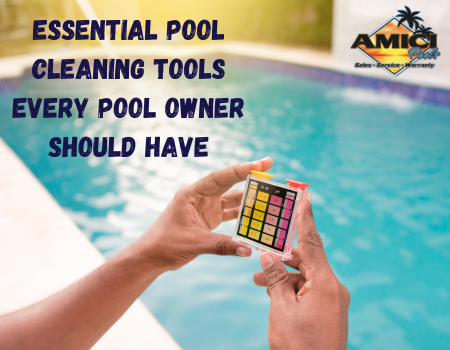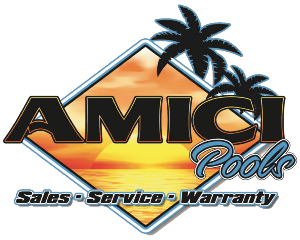Maintaining a swimming pool is more than just a luxury; it’s a responsibility that ensures the water remains clean, safe, and inviting. It doesn’t matter if you’re just looking to improve your maintenance routine or you’re a new pool owner, having the right cleaning tools is crucial.
Guid to essential pool cleaning tools every pool owner should have
-
 Telescopic Pole
Telescopic Pole
A telescopic pole is the backbone of your pool cleaning toolkit. This adjustable pole can extend to various lengths, allowing you to reach different parts of the pool easily. It serves as the attachment point for several cleaning tools such as nets, brushes, and vacuum heads.
- How to Choose: Look for a sturdy, lightweight pole made of aluminum or fiberglass. Ensure it has a comfortable grip and secure locking mechanisms to prevent it from collapsing during use.
- Skimmer Net
A skimmer net, also known as a leaf net or leaf skimmer, is essential for removing debris floating on the pool surface. It helps in quickly scooping out leaves, bugs, and other floating debris, preventing them from sinking and causing further contamination.
- How to Choose: Opt for a skimmer net with a durable frame and fine mesh that can capture even small debris. Some skimmer nets come with replaceable nets, which can be more economical in the long run.
- Pool Brush
A pool brush is crucial for scrubbing the walls, steps, and floor of the pool to remove algae, dirt, and stains. Regular brushing prevents the buildup of slippery and unsightly algae, keeping your pool surfaces clean and safe.
- How to Choose: The type of pool brush you need depends on your pool surface. Use a brush with nylon bristles for vinyl or fiberglass pools and one with stainless steel bristles for concrete or plaster pools. Ensure the brush is wide enough to cover a large area but not too cumbersome to maneuver.
- Pool Vacuum
A pool vacuum is essential for deep cleaning the pool floor and sometimes the walls. It removes dirt, sand, and other debris that the skimmer net and brush can’t handle. There are manual, automatic, and robotic pool vacuums, each offering different levels of convenience and efficiency.
- How to Choose: For smaller pools or occasional use, a manual vacuum might suffice. Automatic vacuums, such as pressure-side or suction-side cleaners, are more efficient and require less labor. Robotic vacuums are the most advanced, providing thorough cleaning with minimal effort but come at a higher cost.
- Pool Filter
The pool filter is a critical component of your pool’s circulation system, responsible for removing contaminants from the water. There are three main types of pool filters: diatomaceous earth (DE), cartridge, and sand.
- How to Choose: Choosing the best filter for your pool is dependent on your specific needs. Sand filters are low-maintenance but may not filter as finely as cartridge or DE filters. Cartridge filters provide excellent filtration and are easy to maintain. DE filters offer the highest level of filtration but require more maintenance.
- Pool Pump
A pool pump works in tandem with the filter to circulate and clean the pool water. It draws water from the pool, passes it through the filter, and then circulates the clean water back into the pool. Proper circulation is vital to maintaining clear and sanitary water.
- How to Choose: Make sure the pump is properly sized for your pool. An undersized pump won’t circulate the water effectively, while an oversized pump can result in excessive energy consumption. Variable-speed pumps are more energy-efficient and offer better control over water flow.
- Water Testing Kit
Regularly testing your pool water is essential to maintain the correct chemical balance, ensuring the water is safe and comfortable for swimming. A water testing kit allows you to measure the levels of chlorine, pH, alkalinity, and other chemicals.
- How to Choose: Choose a comprehensive testing kit that includes tests for chlorine, pH, total alkalinity, and calcium hardness. Digital testers can offer more accurate readings and ease of use compared to traditional test strips or liquid kits.
- Chemical Dispensers
Chemical dispensers, such as chlorine floaters or automatic chlorinators, help maintain consistent chlorine levels in the pool. This is crucial for keeping the water sanitized and free from harmful bacteria and algae.
- How to Choose: For smaller pools, a floating chlorine dispenser might be sufficient. For larger pools or more automated maintenance, consider an automatic chlorinator that integrates with your pool’s circulation system.
- Pool Cover
A pool cover is essential for keeping debris out of the pool when it’s not in use, reducing evaporation, and maintaining the pool’s temperature. Covers also add an extra layer of safety by preventing accidental falls into the pool.
- How to Choose: Select a cover that fits your pool size and shape. There are various types of covers, including solar covers, safety covers, and winter covers. Ensure the cover is durable and easy to use.
- Algae Brush
An algae brush is specifically designed to tackle stubborn algae on pool surfaces. These brushes have stiff bristles that can effectively scrub away algae without damaging the pool lining.
- How to Choose: Select an algae brush with stainless steel bristles for concrete pools, or opt for a combination of nylon and stainless steel bristles for more delicate surfaces.
Keeping your pool clean and well-maintained requires the right tools. Investing in quality equipment like a telescopic pole, skimmer net, pool brush, vacuum, filter, pump, water testing kit, chemical dispensers, pool cover, and algae brush will make pool maintenance more manageable and effective. With these essential tools, you can ensure your pool remains a sparkling, safe, and enjoyable retreat for you and your family. Regular maintenance not only enhances the longevity of your pool but also provides a healthier swimming environment, allowing you to fully enjoy the benefits of your pool.
